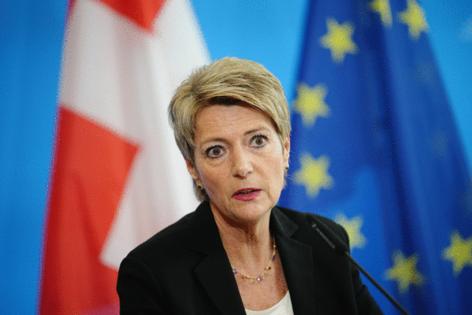Trump forces Switzerland to question its love for farmers
Published in Political News
Switzerland’s bid for a U.S. trade deal risks sparking a showdown with one political force at least as feisty as President Donald Trump: its own farmers.
A country whose lush Alpine pastures, cowbells and cheese underpin the national identity, and whose agricultural lobby wields outsized influence to match, is in danger of a tough reckoning over what that’s worth when economic prosperity is at stake.
While Trump makes no secret of his desire to push farm exports — as evidenced by the inclusion of beef in his framework deal with the U.K. this month — it still came as a surprise when Swiss President Karin Keller-Sutter disclosed that such a political hot potato is on the table in talks with the U.S.
Having lobbied him to rethink tariffs of 31% on Switzerland just hours before the suspension of many of his global levies were announced, she is now pushing hard to be among the next countries to clinch an accord.
Previous confrontations with the U.S., such as over banking secrecy in 2009, are a reminder of just how little leverage it has, and America’s role as Switzerland’s biggest single trading partner apart from the European Union underscores the extent of commerce that’s on the line.
Talks with Washington could ultimately force the government into an awkward choice of taking a brutal economic hit or enduring the political fallout of hurting farmers. In that case, the answer is clear, according to Thomas Borer, a former Swiss ambassador to Germany.
“We cannot snub the world’s most important economy because of an industry that stands for less than 1% of our gross domestic product,” he said in an interview.
In the ongoing trade negotiations with the U.S. — whose second round took place in Geneva this month — outlines of any agreement remain far from clear.
“It’s hard to see what kind of deal could be made,” said Stefan Legge, senior trade researcher at the University of St Gallen. “Many goods the Americans care about are very sensitive to the Swiss. It would be very hard to lower any tariffs there.”
One problem for Switzerland is that it has been uncommonly open to trade, meaning that it’s not easy to find areas for possible concessions to grant the U.S. a face-saving deal. On all industrial products, the Swiss unilaterally abolished tariffs last year.
That leaves agriculture as a key area of focus for the U.S., a big exporter of soybeans, corn, wheat and meat. All those products face high tariffs in Switzerland, which runs its own complex and highly subsidized market for food, forcing Europe’s highest prices on consumers.
A tightly controlled system of quotas applies. On beef, a likely target of the U.S., the Swiss allowed 5,850 tons of high-quality produce to be imported last year. Every shipment above that quota was charged a tariff of as much as 22 francs ($26) per kilogram, almost doubling the average sales price of beef in Switzerland.
“We would vehemently fight” any changes, said Sandra Helfenstein, a spokesperson for the Swiss Farmers’ Association. “For us, it’s completely wrong and inappropriate to talk about deals in the agricultural sector.”
Acceptance of the current design of the domestic food market is widespread, despite its burden on consumers, fostered by a national belief in self-reliance. But bigger economic interests may prevail when set against agriculture, which represents a small fraction of gross domestic product.
The voice of farmers is often amplified in advanced economies, as seen with recent tractor protests from London to Paris and Brussels. In Switzerland, their influence pervades the political system.
In the lower house of parliament in Bern, a quarter of lawmakers are either farmers themselves or have ties to agriculture, according to an analysis by national broadcaster SRF. Three out of the seven members of the Federal Council — Switzerland’s Cabinet — grew up on a farm. Another was a farmer’s apprentice.
And yet, Keller-Sutter, who isn’t one of them, acknowledged this month that agricultural produce is “a topic” of discussion. “It’s down to the people talking on a technical level to look at this very closely.”
Since specific quotas for a single product such as US beef aren’t allowed under the rules of the World Trade Organization — an institution Switzerland supports and also hosts in Geneva — Legge reckons the Swiss will try to find groups of goods they could offer concessions on instead.
The harsh truth however is that Switzerland’s experience with the U.S. shows they don’t have much choice when Washington insists. That’s what happened in 2013, when the country ended banking secrecy after years of pressure from the Americans.
“If the U.S. put their foot down, they could force Switzerland to give up its agricultural protection,” said Legge. “That would be similar to how they forced Switzerland to give up its banking secrecy.”
The domestic political ramifications could be explosive if things went so far as to undermine its food market, though actions so far by the Trump administration, from South Africa to Europe, suggest its officials aren’t shy about stirring things up in individual countries.
Trump’s desire to deliver deals however could still help Switzerland, according to Joost Pauwelyn, an international trade lawyer and professor at the Geneva Graduate Institute.
“Don’t underestimate Swiss diplomacy,” he said. “Whatever deal the Swiss may strike, it would probably have to be accepted by parliament, possibly even by referendum. That could strengthen Swiss negotiators because they can honestly say: Look, we won’t be able to get this through with our people.”
(Hugo Miller contributed to this report.)
©2025 Bloomberg L.P. Visit bloomberg.com. Distributed by Tribune Content Agency, LLC.

























































Comments